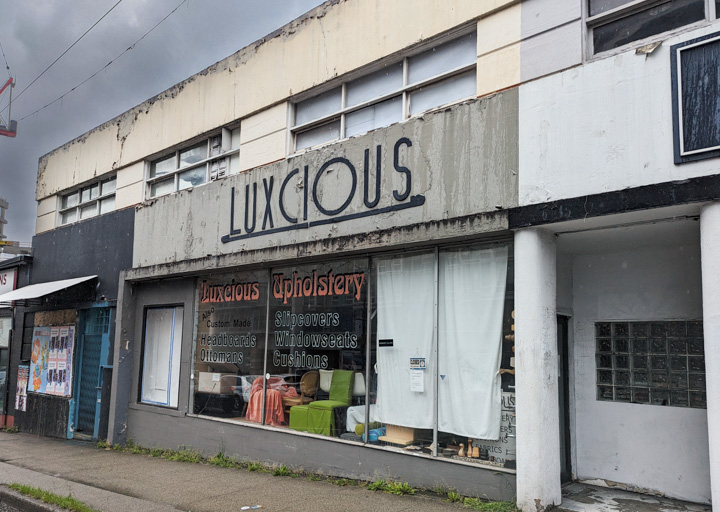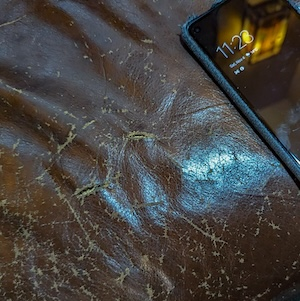
Parable of the Sofa

When Lauren was pregnant with a child who’s now turning 25, we purchased a comfy dark-brown leather sofa which fits our living room nicely. What with kids and relatives and employees and cats and Standards Comittees and friends and book clubs and socials, the butt-support cushions had, a quarter century later, worn out. So we had them replaced, at a fair price, by a small local business. Which is something that modern capitalism is trying to make impossible.

I’ll be honest; when we realized how ratty the sofa was getting, my first thought was “crap, gonna have to buy a sofa”. But Lauren said “No, because new sofas are junk. Also, Luxcious.”
I’ll get to Luxcious in a bit, but it turns out that new sofas, by and large, really are. Why would that be? Well, check out Why Are (Most) Sofas So Bad? in Dwell magazine which has a weirdly-intermittent paywall, here’s another version.
From early in the piece: “Sofas made in the past 15 years or so are absolute garbage, constructed of sawdust compressed and bonded with cheap glue, simple brackets in place of proper joinery, substandard spring design, flimsy foam, and a lot of staples.” It’s excellent, well-written, and will take you some surprising places.
But the subtext is drearily familiar. Globalization: Check. Cheap-labor arbitrage: Check. Tax engineering: Check. High profits: Check. Flat-packing: Check. Late Capitalism: Check check fucking check.
But, quality furniture is expensive to make, and should be, but doesn’t wear out fast, thus deserves extended maintenance.
Luxcious · Its Web site (“Breathe new life into old furniture”) is way prettier than its location, in an old and extremely miscellaneous high-traffic zone: auto-body shops, hipster lounges, self-storage, beauty supplies…
They’re family-run and idiosyncratic. You have to know how to find the sketchy rear parking lot and walk in the back door. But they’re friendly and competent. Here’s the new leather they bought for the cushions.
And here’s the sofa with the re-covered cushions in place.
Yes, from this angle, the new cushions make the sofa’s back look shabby, but it’s not as obvious to the naked eye and after a decade or so we’ll never notice it.
The whole job cost us $1100 Canadian. Given that the sofa cost three-thousand-plus 1999 dollars and new leather sofas of the “not flat-packed sawdust and glue” variety quickly get into five figures, the choice was a no-brainer.
“Lifestyle” · This kind of transaction is exactly what modern capitalism is trying to stamp out.
A single-location family-owned business that provides a living for a few people? With no plans to load up on debt or other financial engineering? Or for growth into unicorn status? No GenAI dimension? No marketing or public-relations people?
In conversation with venture capitalists, you hear the phrase “lifestyle business”, meaning one that is doing nicely and rewarding the people who run it and which isn’t planning for unbounded growth. The words “lifestyle business” are always, of course, uttered in a voice dripping with contempt. Luxcious is a lifestyle business.
It seems blindingly obvious that an economy with a higher proportion of lifestyle businesses is going to be more resilient, more humane, and immensely more pleasant than the one that the Leaders Of Industry are trying to build.
How would we get there from here? I’m not smart enough to figure out what the regulatory regime is that would ban most of what private-equity does and tilt the playing field in favor of resilient lifestyle businesses.
But I’d sure vote for a political party that convinced me it was trying to achieve that.
Comment feed for ongoing:
From: Kegan (Jun 02 2024, at 01:09)
>But I’d sure vote for a political party that convinced me it was trying to achieve that.
https://en.wikipedia.org/wiki/American_Solidarity_Party
[link]
From: Raphael (Jun 02 2024, at 03:37)
Just a small suggestion for making the text a little bit easier to parse:
I initially parsed this sentence:
> "Given that the sofa cost three-thousand-plus 1999 dollars"
as "3000 + 1999 dollars", wondered for a second why you would write it this way, and then understood the correct meaning.
Less ambiguous variants might be:
> Given that the sofa cost more than $ 3000 in 1999
or
> Given that the sofa cost $3000+ in 1999 dollars
[link]
From: Terry Braun (Jun 02 2024, at 07:22)
Micro Payments. Tracking advertisements are nice words for "lies". The business model of the current internet is targeted dishonesty. The corollary is the crucial part. This is the megaphone effect.
Since Google (and others) show dishonest results, honest results get drowned out.
Someone has to pay for the internet. But more importantly the business model of the internet determines what it CANNOT do.
There are other dimensions that I find quite scary. Twitter had code "if democrat then" & "if republican then". In effect then, targeted dishonesty destroys community. And we see that now.
I think we have missed the significance of Sapir Whorf. If we do not limit it to verbal language or to just thinking, the result is that our modes of interaction determine our society. (See Twitter and Teargas).
I'm a big fan of John Holland's "Hidden Order" because it made me think about constructing artificial gestalts. I worked on an implementation of the early RIP routing protocol and recognized that it was odd and only later realized it is an artificial gestalt.
I'm still working on Webkeycard.com & billzly.com - both of which sometimes work. And now Aroostookian.com. A prototype local community site.
Best
Terry
[link]
From: Chris R (Jun 02 2024, at 08:06)
I think the thing I truly hate about furniture right now is that I have no way at all of knowing if I'm buying good furniture or globalization-killed flat pack shit, and no sense of how to start to find it.
[link]
From: Karen Breakey (Jun 02 2024, at 10:08)
“ I’d sure vote for a political party that convinced me it was trying to achieve that.” Me too. Great discussion of a decades-old business. But, do you think lifestyle businesses created today can be profitable enough for the owners and employees to live decent lives and become homeowners in this neofeudal economy without family money behind them? Trying to be optimistic (I don’t have family money and I yearn for a walkable world). But I have my doubts
[link]
From: Rob (Jun 02 2024, at 10:50)
Part of this is not just rapacious late stage capitalism. Part of it is market-driven environmentalism. Wood of any kind, be it construction lumber or finer furniture quality, is ridiculously expensive. It was bad enough pre-pandemic; now it is unbelievable. In North America at any rate, this (along with NIMBYism of course), is one of the drivers of the housing crisis-- my organization has been trying to build things for a couple of years now, but construction costs are off the charts.
This is not entirely a bad thing, we need to protect and grow our forests, not chop them all down. But mdf/particle board (often covered with veneer, which is where a lot of the precious actual wood is going-- veneer-making is a magical and beautiful Black Art) is what almost everything is made of these days. Its heavy as Scandinavian black metal, as fragile as Donald Trump's ego, and as impossible to repair as a Middle East peace process. Lovely stuff.
I dunno, I am very uncertain about the economic & environmental trade-offs of super-expensive but long-lasting, vs cheap and crappy disposable furniture.
But I do know buying furniture of any quality is a lot like buying a car from a super sleazy high pressure used car dealership. Those places are, of course, hotbeds of usurious financing schemes exploiting the poor and the optimistic.
I do think we might all be a lot better off on all counts buying used stuff from Goodwill or equivalent, and employing shops like Luxicious to rehab it.
[link]
From: Bryan William Jones (Jun 02 2024, at 19:42)
Thank you for this. At the beginning of our marriage, we decided that all of our furniture would be purchased only when we could afford pieces that would last our lives and that could be repaired or refurbished.
So, this post has been a delight to read.
[link]
From: Cath (Jun 03 2024, at 16:03)
I still have the antique-at-that-time horsehair covered second hand sofa bought cheap in 1979 and recovered once (in Vancouver for twice what you just paid). Want it back?
It has been moved umpteen dozen times and not once has a mover stated a moving disclaimer about it as they always do with the flat-pack stuff! They just groan about its weight!
[link]